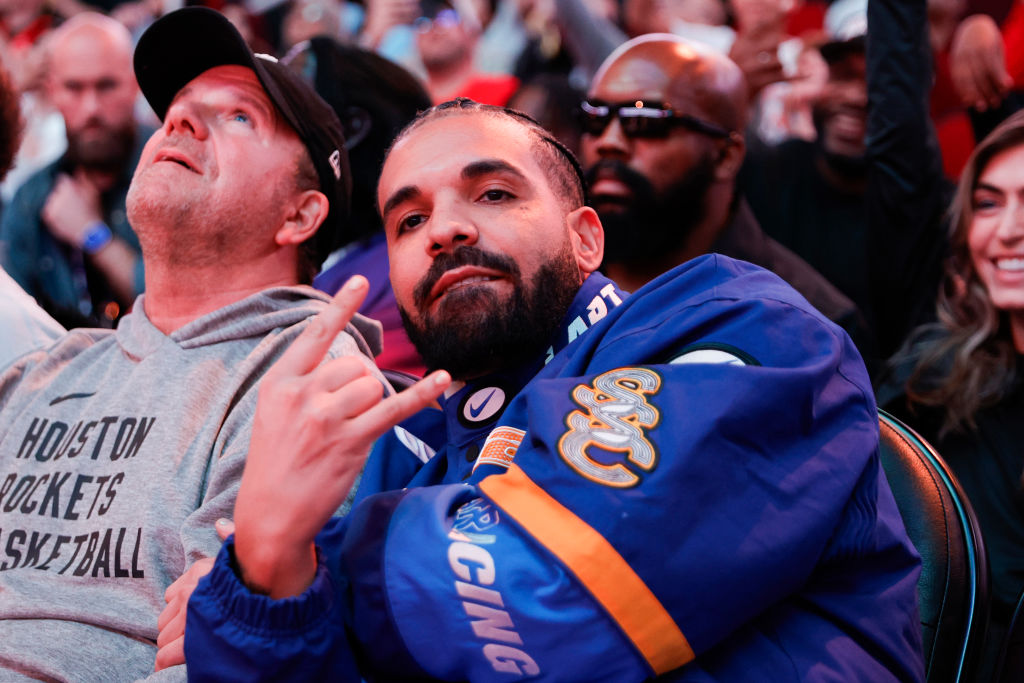The 2018 CASSIUS Creative Class embody a set of attributes that we feel are reflective of the emerging creative class at-large. Each person or group is on the cutting edge of culture — whether it be putting People of Color in places they haven’t normally been a part of or simply taking their passions and turning them into a career. Check out this gallery to see all of the dope up-and-coming members of the Creative Class.
Nominate yourself or someone you know who embodies the spirit of the CASSIUS Creative Class series by emailing creativeclass@ionedigital.com.
1. Trusting the process is vital, as stated by Dui Jarrod
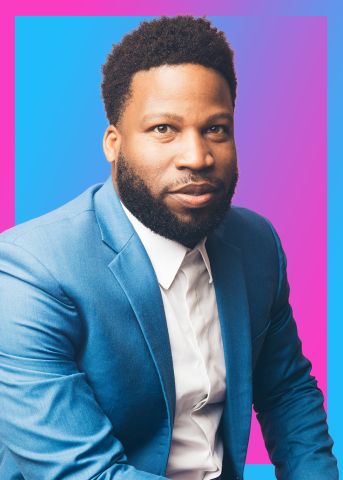 Source:iOne Digital
Source:iOne Digital
Having Black people and people of color present for the sake of diversity can be a sticky situation. While it’s true that talented, hardworking people deserve opportunities, it’s discouraging when we know that we are only being selected for the sake of entities being able to say that they’re inclusive. Brooklyn-based writer/producer Dui Jarrod briefly disclosed his opinion on this.
“Inclusiveness always presents complex challenges and can at times break your spirit. You’re asking an extremely nuanced question,” Jarrod said. But, he also made sure to let me know that he doesn’t give too much power to those situations though. “[He] just [focuses] on the work and [trusts] the process.”
Source: Elton Anderson / Creative Services / iOne DigitalAdditionally, Jarrod made known his opinion on how key it is to form a faction with other folks living and striving in Brooklyn. People think that careers —and life itself— are entirely solo efforts, but that’s just not true.
He said, “the opportunities for film work are harder to garner here as opposed to Hollywood. But, the central theme for all of us is excellence. To be able to look from my left to right and know the feedback and perspective is only going to refine my voice is comforting.”.
2. Alesia Etinoff’s experiences with higher education is all positive
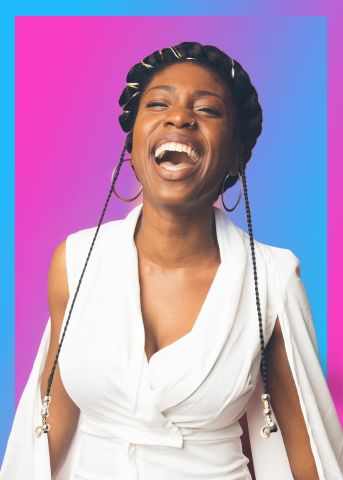 Source:iOne Digital
Source:iOne Digital
Alesia Etinoff is a comedian who uses her platform to thoughtfully share her perspectives. Comedy has long been considered a field for white males, but Etinoff is following in the footsteps of commentators such as Richard Pryor and Moms Mabley and making her voice stand out amidst a colorless background.
Etinoff’s experience with higher education correlates with her purpose, as it speaks to how people of color can work together to encourage inclusivity in white spaces. While she attended Carnegie Mellon, she served as a community service chair of a black awareness club and worked with the school/participated in programs to make her time there less isolating. This set the stage for her life post-graduation, as she continues to combat “homophobia, mass incarceration, bullying, and white supremacy via Eurocentric beauty standards”.
3. Kendra Chapman is focused on the type of content she wants to see
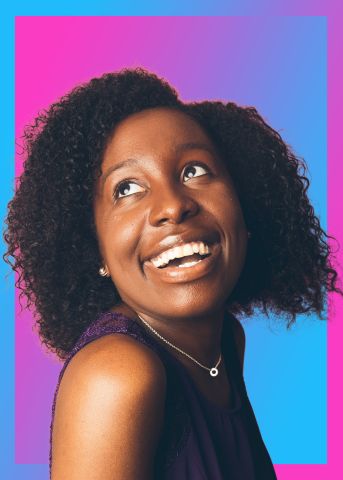 Source:iOne Digital
Source:iOne Digital
Writer Kendra Chapman isn’t blind to the ways of mainstream media. She knows that Black people and their lifestyles are covered by outlets and portrayed in media – now more than ever. Chapman is also knowledgeable of the fact that “Black people have always been tastemakers and trendsetters”. While the coverage isn’t inherently negative, some of it is rooted in “a toxic mixture of admiration and envy”.
Rather than dwell on the anti-genuine nature of some channels, Chapman instead focuses on the type of content she wants to see.
“I want more narratives about people of color going through experiences that aren’t solely based on the color of our skin,” she says. “I want to see us saving the world, as both fictional and everyday superheroes.” Ultimately, these are the stories that matter most to Chapman— expansive ones that are rooted in reality and hope.
4. Travis La Branch refuses to be told no; his talent will not go unrecognized
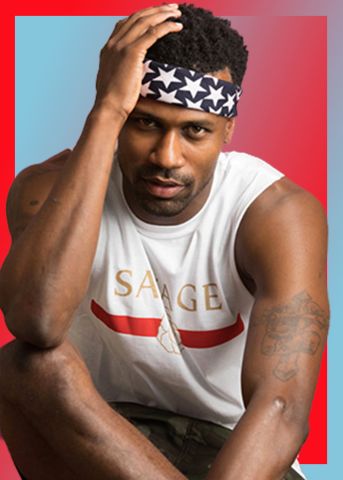 Source:iOne Digital
Source:iOne Digital
It’s always refreshing to come across someone with vigor and a healthy amount of optimism, regardless of the heaviness of the subject matter. That breath of fresh air is present in actor Travis LaBranch, whose upbeat personality is easy to pick up, even via e-Communication. The topic of discrimination and representation is enough to draw a long, gray response, but although LaBranch is aware of what’s happening, he doesn’t let it destroy him.
“I am pretty sure [discrimination] affects me at times…especially [with me] being an African American male…I fight past and ignore all negative activity but [I] am not blind to it. I know it exists, [I] know it happens…[but] I REFUSE TO BE TOLD NO,” LaBranch divulged.
He stands in support of films and shows that he believes serve the Black community and glorify our diversity. Some examples of these are Black Lightning, This is Us, Black Panther, and Black-ish.
5. Sanford Jenkins Jr.’s childhood taught him to choose allyship
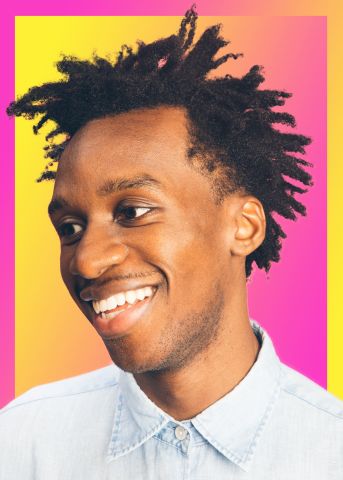 Source:iOne Digital
Source:iOne Digital
Film director Sanford Jenkins Jr. is yet another champion for empathy. He believes that people live how they’d like, but empathy is the path he’s chosen for himself. Jenkins also understands that you can’t exactly mold people’s personal opinions of you, but you can do your best to relate to others. Maybe, just that same understanding will come back to you.
Jenkins believes in allyship, which is something he thinks is ingrained in him because of his upbringing. When asked about his innate sense of helpfulness, he said, “There comes a point when your consciousness aligns with physical life, and your spirit is nurtured with that gift of humanity (if you believe in humanity). As an artist, that energy is channeled formally and carried forward.”
6. April Reign reveals that digital energy is a real thing, especially when it comes to innovators and public figures
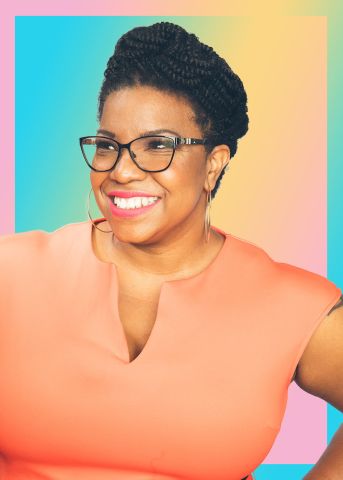 Source:iOne Digital
Source:iOne Digital
#OscarsSoWhite creator April Reign is known for her articulate callouts of reductive spaces. Activists have followed in her footsteps online, and the hashtag that was established three years ago has taken on a life of its own. Beyond her Twitter prowess, Reign is also an accomplished writer and practiced law for 20 years.
A lot of her work has to do with racial issues, and with that comes commentary from white people. Some are trolls and others are legitimate allies. It is up to her to decipher between the two, and her answer on how she maneuvers through those situations is a wise one.
“The easiest way to distinguish racist commentary and valid criticism is to determine the end goal. Is the person truly interested in having a dialogue or do they just want to make a point, which is usually faulty? The answers to these questions help me determine how I respond, and the amount of energy I decide to share.”
Talks on digital platforms can require energy that not everyone should be privy to. Reign is becoming a master at knowing exactly how much to give and who is worth engaging with.
7. Huriyyah Muhammad says she “fights like hell to make sure [she’s vocally] present” in a time of constant marginalization
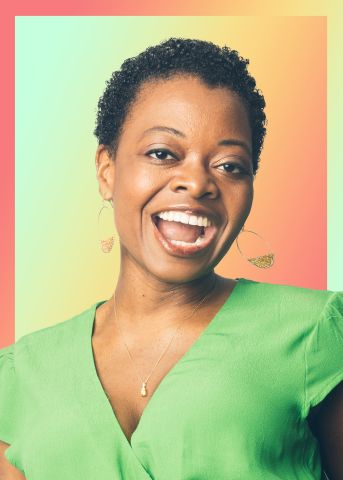 Source:iOne Digital
Source:iOne Digital
Huriyyah Muhammad will not be pushed to the background. In a world that often tries to silence forward-thinking individuals, Muhammad “fights like hell to make sure [she’s] present.” Her way of life (which includes frequent meditation) inadvertently encourages others to push to assure that their thoughts are heard as well. She also relayed that her tribe, a community built through the Black TV and Film Collective, grants her the power to go on.
Inclusive institutions can be highly beneficial to people of color, for they encourage positive relations and can be tension-free environments. Muhammad outlines her alma maters Spelman University and the NYU Stern of Business as organizations that consistently made her feel welcomed. This sense of home is one that she infuses into the Black TV and Film Collective, a nonprofit arts organization of over 1200 members that [she] co-founded. That exact energy has been given back to her tenfold, as she has been included in the Sundance Creative Producing world as a 2018 fellow.
8. Karla Ferguson’s explains why it’s important to stop being isolated and embrace different view points
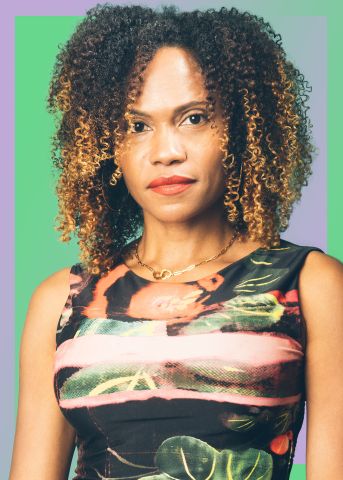 Source:iOne Digital
Source:iOne Digital
Curator and owner of Yeelen Gallery, Karla Ferguson, is on the fence about how marginalization, and its subsequent seclusion, has informed her life, and rightfully so.
“There are times when being alone allowed me to get focus and look at my goals from various perspectives…I am able to better listen to my intuition and take action accordingly. Unfortunately, [alienation] also means that I find myself having moments where I sit down and ask myself “[Where to next[?], which can cause some anxiety at times.”
Source: Elton Anderson / Creative Services / iOne DigitalThis is something that other creatives of color face, as they attempt to navigate uncharted territory. The question of how to complete a mission that no one with your skin tone has done before comes up often, but Ferguson reminds us that we are stronger together.
“When underrepresented people band together you get the benefit of differing viewpoints and expertise, and it is a beautiful thing when all the puzzle pieces fit in order to form a clear picture or idea,” is what Ferguson said when asked about stratified groups.
9. Eric Dickens has valuable information to share about Black, masculine vulnerability
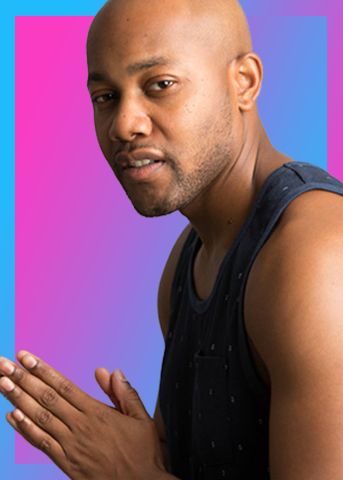 Source:iOne Digital
Source:iOne Digital
The social construct of hypermasculinity is one that has been dissected and deconstructed over the past several decades. Publicly beginning in the latter half of the 1900s, and peaking as I type, people are openly interested in getting to the root of problematic male behavior and the need to bottle up emotion. Black men specifically are at the heart of the conversation, because they have been stamped as unworthy when it comes to healthy, emotional expression.
Producer, director, and writer Eric Dickens is aware of this, and thus tries to open conversations about Black male emotion in his work. “Masculine vulnerability within adult relationships is a topic that I touch on a lot in my work,” says Dickens. As Black men, we are taught that showing too much emotion is a sign of weakness, but I believe that in order to..live a healthy life, one must be in touch with his emotions. Ignoring or minimizing your feelings can lead to mental illness.”
In a time where honest discussions about Black mental health are less taboo, Dickens’ thoughts and works are imperative. We have to rethink the pressure we sometimes unknowingly put on Black men and understand that they are not superheroes, but instead, humans with feelings.
10. You have to protect your mental health to survive, just ask actor Kamel Goffin
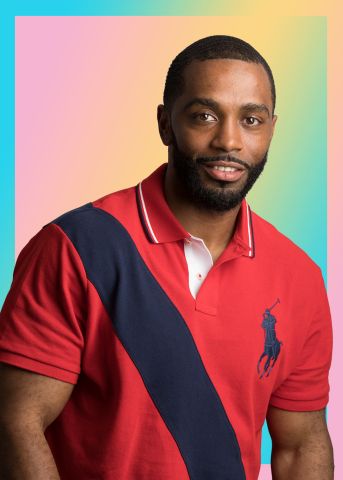 Source:iOne Digital
Source:iOne Digital
Actor Kamel Goffin is invested in his mental well-being, which is something to celebrate these days. We have watched talented, brilliant minds, like Phyllis Hyman, spin out of control because Black people aren’t always taught the value of self-care. We aren’t told that the most radical form of resistance is love for ourselves. It’s all too easy to get sucked into the 24-hour news cycle, poor sleeping habits as a result of overworking, and general unwellness. Goffin has found his center though, and he’s not going to lose it.
“I have protected my mental health by taking time for me,” he says. “Doing things like going to the gym, sitting alone to meditate and going to church. I also…protect myself from the many images that we see on social media that make us feel helpless, weak, or inferior as black people.” These steps may seem small, but they are an integral part of Goffin maintaining his balance.
11. Yajaira De La Espada knows that in order to change the world, you have to start with the Black and brown youth
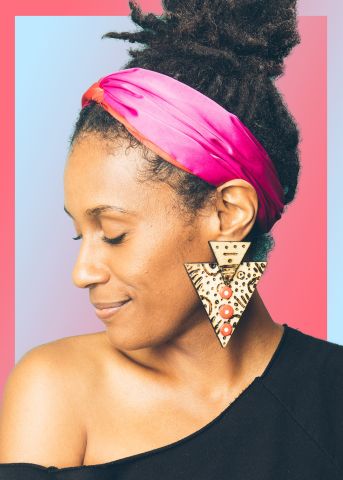 Source:iOne Digital
Source:iOne Digital
Since ancient times, societies across the world have spoken on the power of educating the youth. The oft-studied philosopher Socrates was executed due to his influence over the young people of Greece. Even though the American educational climate is deeply flawed today, there is still an intense emphasis on how important it is to seek education from a variety of sources, including the public school system and higher education. Yajaira De La Espada is someone who is pushing for the tutelage of Black and Brown students especially since they are so often left to fall through the cracks of society.
The earlier you start sharing valuable data with children, the better, which is where Espada, an ECE instructor, steps in. She shared, “it is of dire importance that early childhood education be rich with cultural accuracy, critical thinking strengthening, and imagination enhancing. We as people of color, come from a rich history of storytelling. It is vital for our children to learn how to tell their own story.”
If you’ve experienced the whitewashing of the American school system, you understand that Espada is righteous in her desires for Black and Brown learners. We have strategically become the social groups who can’t share our complete histories, which is not only problematic on a psychological scale, but practically difficult as well.
12. Brian Vincent Rhodes speaks to the internet being a useful tool but not a replacement for one on one interactions
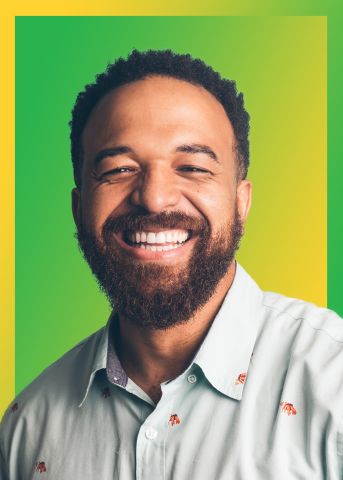 Source:iOne Digital
Source:iOne Digital
Animator Brian Vincent Rhodes gets how powerful the internet is. When I asked him if the digital world allowed him to self-advocate more frequently, he responded with the following:
“The internet is great because while you sleep, people can be checking out your work. Also, although I use it sparingly (it’s addictive to me), social media has allowed me to get the word out on my films and where they are playing in festivals. I have had great support from having a presence online, and it has also allowed me to help support my friends and their endeavors as well.”
This is huge, as it means the internet has become a safe space for Black people to link up, exchange their ideas, and create a network of like-minded individuals. This capability is one that repressive beings have tried to stomp out throughout history, but it can’t be done. Once again, Black people have found a way to triumph.
Rhodes also made sure to say that human interaction is just as key as eCommunication.
“I also believe in trying to interact with people one on one if I can.”, he says. “Nothing beats human interaction and word of mouth, but I definitely understand the power of the internet when that is not possible.”
13. Director Kelley Kali Chatman unpacks a story of racial cruelty and uses it’s lesson to make the world more loving
 Source:iOne Digital
Source:iOne Digital
You know those people who claim “new Blackness” or think we live in a post-racial society? Yeah, they’re totally delusional. It actually disrespectful to believe that in the less than 60 years since the end of the implementation Jim Crow, we’ve entered an era where race is nothing but a mental construct. This harsh reality is what made Kanye West’s “free thinking” rants so dangerous. Racism is real, and no amount of money or singular philosophy can instantly kill it. Director Kelley Kali Chatman, a Los Angeles native, has the receipts to prove it.
“My parents are an interracial couple from Pittsburgh, PA..To say the least, their relationship certainly wasn’t welcomed in Pittsburgh, or much of the U.S. during the 80’s.”, Chatman explains. [They then moved to California.]
One Christmas, when I was about 9.., I remember receiving a beautiful Christmas card to our house…The card had this gorgeous glittery white snow covered Christmas tree on the front of it… Then, as my parents opened the card, we all saw written in huge letters, “ARE YOU DREAMING OF A WHITE CHRISTMAS, NIGGER?!” I may have been a child, but I knew what that meant and for the first time, despite my parent’s efforts of trying to protect us from racism, I felt violated.”
Now, Chatman makes it clear that all of her experiences growing up as a woman of color in LA were not violently horrific. She says that overall, she enjoyed her rearing and understands why her family relocated there. But, she knows that incident was the product of pure hate and looks at the world through realistic lenses. Creating space for conversations to happen and educating young people are a few of the ways she thinks we can move forward. In closing, Chatman says “we have to work as a community in order to address the challenging truth of the problem, rather than ignoring it”. Selah.
14. Meet Dubois Ashong, the filmmaker who wholeheartedly believes in empathy
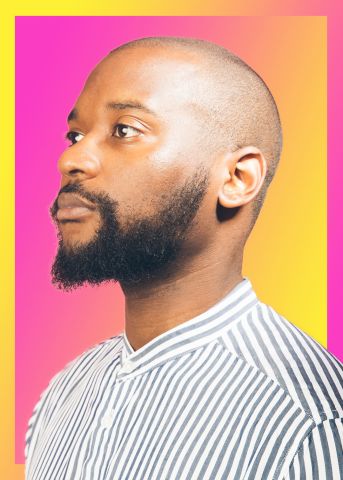 Source:iOne Digital
Source:iOne Digital
AFROPUNK celebrated director Dubois Ashong is much more than a talented filmmaker. He is also a politically aware force who is unafraid to express his thoughts on the structures that affect us all. Ashong believes that at its purest, art has the capacity to “[make] people think, create conversation, and hopefully spark change.” Additionally, his primary message is one that many people can relate to— empathy.
“Many of us, including myself, shun empathy from situation to situation for various reasons…I feel the work is to first look inward in order to then come to the true understanding that all life forms are imbued with the same energy.”
Ashong is dedicated to incorporating the idea of shared emotion into his life and work, as the concept ties into his latest work, WHERE THE WATER RUNS. In the film, money trumps the value of human life. This can be avoided in everyday life if we follow Ashong’s lead and allow ourselves to feel for one another.
15. Get into Terrence Price’s remarks on gentrification and the disappearance of his community before his eyes
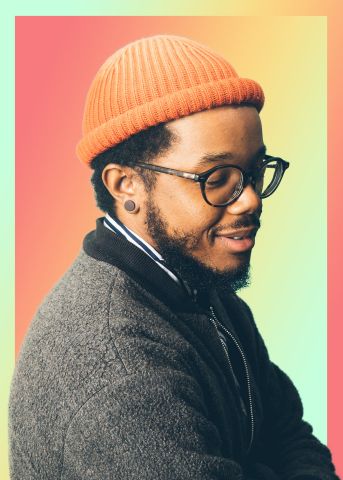 Source:iOne Digital
Source:iOne Digital
It is incredible that Black and brown people have been able to run with certain limitations. Racism and the inability to participate have threatened the stock of our existence, especially the creative and basic living aspects. Think about how many unknown —or uncredited— inventors, designers, and artists who have remained nameless only because of their race. Alternatively, reflect on the neighborhoods and cultures that have been gentrified because forces that view themselves as higher grant themselves the right to do it.
Source: Elton Anderson / Creative Services / iOne DigitalTerence Price, a Miami-based street photographer is all too aware of how dangerous marginalization can be.
“Most of the people I feel that are in marginalized communities don’t know that they are being seen as insignificant. I live in a community that I wouldn’t say is suffering from that but slowly you can see how we’re being closed in from all angles. For instance, local stores [and restaurants] start to disappear and people who’ve been living in the community for years start to move because of not being able to afford the cost of living anymore.,” the ArtCenterSF 2018 Resident shared.
Price is an excellent example of someone to be like. Not only is capable of speaking about the state of his community, he has tethered himself to documenting it as well. Because what good are talents if you don’t use them to shed light on the things around you?
16. People have a right to know about their identity, according to journalist Christian Portilla
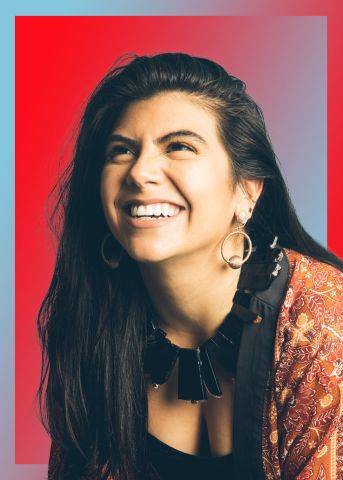 Source:iOne Digital
Source:iOne Digital
Latina journalist Christian Portilla can recall the first time she felt out-of-place. She had returned to Colombia after living in Miami and realized that even though she was essentially home (her mother is from Colombia), she was still considered to be a part of the “other.” “It was one of the first times my identity was questioned because in Colombia I am gringa, but in Miami, I am Latina,” Portilla revealed.
Source: Elton Anderson / Creative Services / iOne DigitalThe issue of identity has become more pressing in recent centuries, specifically the 20th and 21st. We want to celebrate our birthdays, we want to explore beyond the boundaries of familial tradition, and we have a burning desire to truly know ourselves. This reality prompted Portilla to take a DNA test to learn more about her history.
When questioned about the deep inner longing for personal understanding, the journalist said, “Socially, and with the times we are living in now, I feel like people want to know more about their identity…, so they can stand up for the injustices of their people. I…wanted to know more about myself, so when I fight, I can fight with more authority because I am… informed about my culture.”
17. It ain’t easy being seen – a chat with Robyn Greene Arrington
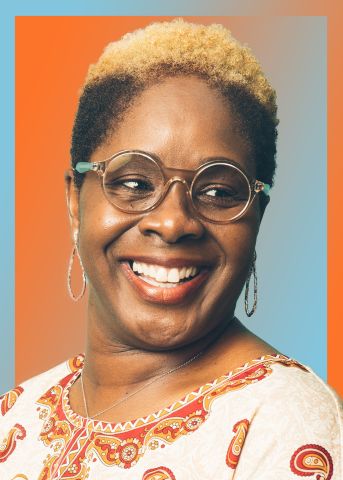 Source:iOne Digital
Source:iOne Digital
As a Black woman, it hasn’t always been easy to spot myself in popular culture. Many times, we are either stereotyped or are presented with the white versions of our lives, ideas, and trends. The masses must begin to consistently recognize our complexity as individuals, or we are at risk having our records skewed. Robyn Greene Arrington, the Vice President of Original Programming and Production, is one of the “unicorn” individuals who has benefited from seeing versions of herself in media over the years.
Source: Elton Anderson / Creative Services / iOne DigitalArrington believes that there wasn’t a singular, primary incident that allowed her to see a reflection of herself in the mainstream world. It happened over the course of time.
When talking about iconic Black women in media and on television, she says, “[from] little Janet Jackson on church fans…to the many looks of Thelma Evans on Good Times..Oprah, Girlfriends…journalist Rolonda Watts, superstar Whitney Houston, [and] Beth Pearson on This is Us.”
Arrington has hope for the future as far as representation is concerned. She shared the reasoning behind her optimism.
“The good news is that there [is] the massive collision of societal evolution, technology and perseverance, I am confident that our reflections will continue to come into focus more.”
18. John D. Tucker (Dr. Teeth) masterfully breaks down the power of perception
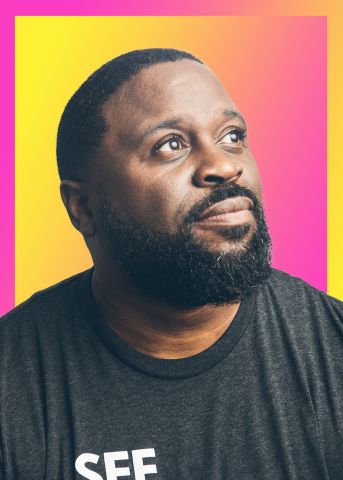 Source:iOne Digital
Source:iOne Digital
Perception and reality aren’t always the same, according to John D. Tucker. Tucker, the video director known as Dr. Teeth, has valid thoughts on the nature of millennials and the way they emulate what they understand to be the “American Dream.” He knows the importance of healthy goals, work ethic, and discipline, which are things that young people may lack as they strive towards unrealistic desires.
The man behind some of hip hop’s grittiest music videos takes full responsibility for his role in how young people perceive the world, yet actively works to present narratives that are grounded, meaningful, and constructive. Also, he wants to help white people alter their perceptions of Black people.
Tucker realized that one of the things that prevents white people from seeing themselves in Black people is the way that the latter are showcased in stories. “When you can personalize [something] or make [it] relatable, you humanize it… I’m hoping to provoke thought.” As an educator and creative, Tucker aims to transform the false ideas that have permeated cultures and help people move forward with heightened understanding.
19. Najja Moon is the queer champion we’ve been waiting for
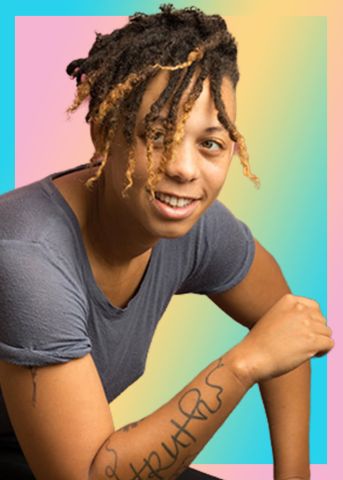 Source:iOne Digital
Source:iOne Digital
One half of Lunchbox Miami (a collective for lesbian, bisexual, and queer women), Najja Moon recognizes the link between her identity and her work.
Sometimes people —such as Whitney Houston and Queen Pen— are made to think they have to hide who they are, or make sure that only their productions receive attention. The downside of this is that it creates a confusing image for young LGBTQIA+ people, who don’t know the back story of their heroes and may feel excluded due to the fact that they may think their fave is heterosexual.
Moon went in-depth about how her sexuality informs the work that she does.
“As a black, queer, woman there is visibly quantifiable evidence of my otherness in almost all parts of my identity. Existing with that experience was a low-key education in how powerful identifying intersectionality is in communicating, surviving, thriving in the community.”
Essentially, it is nearly impossible to separate who she is from her collective. Moon has set up her career to where you must acknowledge queerness and how there is such a sense of community present, especially amongst people of color. The world is certainly better because of it.
20. If you want a greater understanding of nuance in Caribbean culture, Third Horizon is the collective to pay attention to
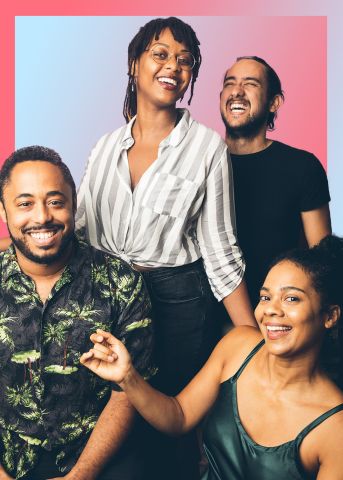 Source:iOne Digital
Source:iOne Digital
With a hyper-focus on their culture, Third Horizon has been able to share unique stories that are reshaping how we view the Caribbean. Sadly, the beauty present in the Caribbean is glossed over in documentaries and tourist-like documentation of the islands, which has the ability to overshadow more realistic depictions. Jason Fitzroy Jeffers, one of the collective’s founding members, shared that the Caribbean deserves more nuance— and he’s right.
The crew takes their name from the term “Third World” which is an offensive term. It refers to countries that have chosen not to assimilate, and also have experienced economic and political problems. The damning aspect of this is that no one discusses how some of these territories in the Caribbean came to be impoverished. The role white colonizers played is muted.
Taking an opportunity to transform a negative into a positive is just what Third Horizon did, even though they have issues with the original phrase. “I’ve always resented it. Even though it’s a somewhat outdated term now, it still rubs me wrong,” said Jeffers. “Growing up in Barbados, even as a little boy, I struggled with the connotation that existence in the so-called “Third World” was somehow lesser than that in the so-called “first”, especially when the societies commonly held as so much more developed have mined so many resources, ideas and so much people power from these smaller, darker nations.” The organization has its sights set on radicalizing consciousness though, slowly but surely.
21. Introducing Alton Glass, the man who is determined to evolve the art of storytelling
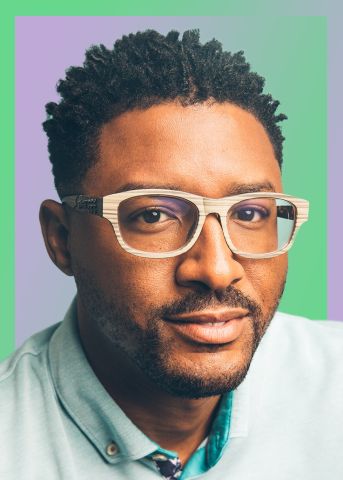 Source:iOne Digital
Source:iOne Digital
Writing is under attack— plain and simple. President Trump’s war on “fake news”, the current amount of disrespect journalists receive, and at its most extreme, the murder of several Capital Gazette employees, are just a few examples of the ways the powers that be are working on destroying the spread of information. Thankfully, there are brave people like Alton Glass who are not only fearlessly telling critical stories, but also evolving the art form.
“The pencil and pen [were once] considered [two] of the most powerful pieces of technology…then came books, typewriters, radio. etc. It’s all storytelling..” said Glass, a writer/director who clearly believes in honoring the basics.
Glass also fully comprehends the necessity of the intersection of Black life and methods of communicating our realities. If you rely on someone else to inform the masses about Black thought and history, you almost have to expect inaccuracy. Glass addressed this and also asked a pivotal question during our talk. “There is a psychological evolution we undergo with technology..our stories must evolve with the mediums to reshape..constructs about black culture. Who will we be in 50 years and what will we know about our history without authentic storytelling?”
22. Detavio Samuels wants to see creators with smaller audiences win
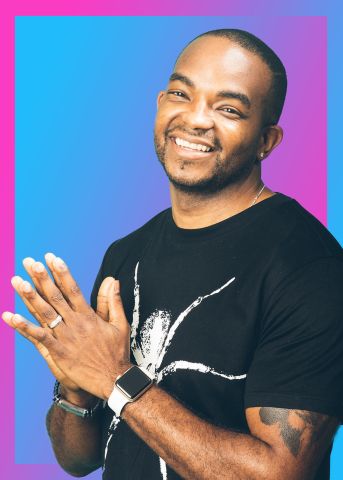 Source:iOne Digital
Source:iOne Digital
Boss man Detavio Samuels is shockingly humble. He’s the man behind some of the biggest Black media brands in the game, such as Bossip, MadameNoire, and HipHopWired, but you’d never know because he has a habit of putting culture before himself. His undertaking is to simply and respectfully highlight Black culture and it’s best players.
One of the things that inspired Samuels was the prominence of the White gaze and how it was dominating the way stories were told.
“Corporate America’s White gaze prevented it from seeing the huge opportunity that stories rooted in Black culture represented…[S]o we needed people like myself and targeted brands like TV One..to ensure Black people could see themselves in media,” he said.
Things have changed since then though. Samuels pointed out that in his mind, it’s no longer just a matter of getting Black content out there. Now, he focuses on giving smaller creators a platform to freely express themselves, benefit financially, and work with those who know the details of the Black experience. While his mission has shifted a bit, Samuels is forever dedicated to Black people and the amplification of their voice throughout the world.
